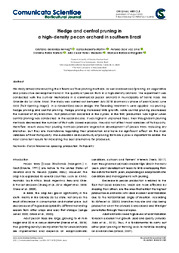Hedge and central pruning in a high-density pecan orchard in southern Brazil.
Hedge and central pruning in a high-density pecan orchard in southern Brazil.
Author(s): HELLWIG, C. G.; MARTINS, C. R.; LIMA, A. D. V.; BARRETO, C. F.; MEDEIROS, J. C. F.; MALGARIM, M. B.
Summary: This study aimed at evaluating the influence of two pruning methods, as well as absence of pruning, on vegetative and productive development and in the quality of pecan fruits in a high-density orchard. The experiment was conducted with the cultivar Melhorada in a commercial pecan orchard in municipality of Santa Rosa, Rio Grande do Sul state, Brazil. The study was carried out between July 2018 (dormancy phase of plants) and June 2020 (fruit ripening stage). In a randomized block design, the following treatments were applied: no pruning, hedge pruning and central pruning. Hedge pruning increased limb growth, while central pruning decreased the number of dry branches. Fruit production oscillated in the cycles. In the first, production was higher when central pruning was conducted. In the second cycle, it was higher in unpruned trees. Even though both pruning methods decreased the number of fruit with closed epicarps, they did not affect most variables of fruit quality. Therefore, results show that pruning methods promote vegetative development of pecan trees, reducing dry branches, but they are inconclusive regarding their production and have no significant effect on the main variables of their fruit quality. The evaluation and continuity of pruning for more cycles is important to obtain the most consistent results for indicating the best alternative for producers.
Publication year: 2022
Types of publication: Journal article
Keywords: Carya illinoinensis, Noz Peca, Poda
Observation
Some of Embrapa's publications are published as ePub files. To read them, use or download one of the following free software options to your computer or mobile device. Android: Google Play Books; IOS: iBooks; Windows and Linux: Calibre.
Access other publications
Access the Agricultural Research Database (BDPA) to consult Embrapa's full library collection and records.
Visit Embrapa Bookstore to purchase books and other publications sold by Embrapa.

